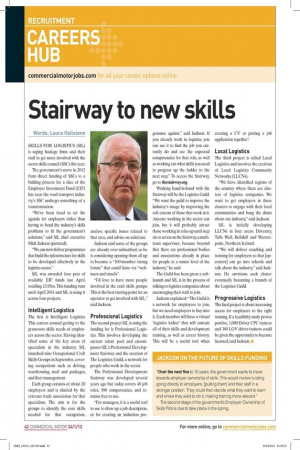Stairway to new skills Words: Laura Hailstone SKIL
Page 36

If you've noticed an error in this article please click here to report it so we can fix it.
Stairway to new skills Words: Laura Hailstone SKILLS FOR LOGISTICS (SfL) is urging haulage firms and their staff to get more involved with the sector skills council (SSC) this year.
The government's move in 2012 from direct funding of SSCs to a bidding process for a slice of the Employer Investment Fund (EIF) has seen the road transport industry's SSC undergo something of a transformation.
"We've been freed to set the agenda for employers rather than having to bend the industry's skills problems to fit the government's solutions," said Sit chief executive Mick Jackson (pictured).
"We can now deliver programmes that build the infrastructure for skills to be developed effectively in the logistics sector."
Sit was awarded four pots of available EIF funds last April, totalling £3.95m. This funding runs until April 2014 and Sit is using it across four projects.
Intelligent Logistics The first is Intelligent Logistics. This centres around getting to the grassroots skills needs of employers across the sector. Having identified some of the key areas of specialism in the industry, Sit launched nine Occupational Craft Skills Groups in September, covering occupations such as driving, warehousing, mail and packages, and fleet management.
Each group consists of about 20 employers and is chaired by the relevant trade association for that specialism. The aim is for the groups to identify the core skills needed for that occupation, analyse specific issues related to that area, and advise on solutions.
Jackson said some of the groups are already over-subscribed, so he is considering opening them all up to become a "100-member strong forum" that could liaise via "webMars and emails".
"I'd love to have more people involved in the craft skills groups. This is the best starting point for an operator to get involved with Sit," said Jackson.
Professional Logistics The second project Sit is using the funding for is Professional Logistics. This involves developing the current talent pool and encompasses SIL's Professional Development Stairway and the creation of The Logistics Guild, a network for people who work in the sector.
The Professional Development Stairway was developed several years ago but today covers 48 job roles, 500 competencies, and remains free to use.
"For managers, it is a useful tool to use to draw up a job description, or for creating an induction programme against," said Jackson. If you already work in logistics, you can use it to find the job you currently do and see the expected competencies for that role, as well as working out what skills you need to progress up the ladder to the next step." To access the Stairway, go to thestairway.org.
Working hand-in-hand with the Stairway will be the Logistics Guild. "We want the guild to improve the industry's image by improving the self-esteem of those that work in it. Anyone working in the sector can join, but it will probably attract those working in roles up until step six or seven on the Stairway, a multiteam supervisor, because beyond that there are professional bodies and associations already in place for people at a senior level of the industry," he said.
The Guild has been given a softlaunch and Sit is in the process of talking to logistics companies about encouraging their staff to join.
Jackson explained: "The Guild is a network for employees to join, but we need employers to buy into it. Each member will have a virtual 'logistics locker' that will contain all of their skills and development training, as well as career history. This will be a useful tool when creating a CV or putting a job application together': Local Logistics The third project is called Local Logistics and involves the creation of Local Logistics Community Networks (LLCNs).
"We have identified regions of the country where there are clusters of logistics companies. We want to get employers in these clusters to engage with their local communities and bang the drum about our industry," said Jackson.
Sit is initially developing LLCNs in four areas: Daventry, Taffs Well, Bellshill and Warrenpoint, Northern Ireland.
"We will deliver coaching and training for employers so that [operators] can go into schools and talk about the industry," said Jackson. He envisions each cluster eventually becoming a branch of the Logistics Guild.
Progressive Logistics The final project is about increasing access for employers to the right training If a feasibility study proves positive, 1,000 Driver CPC trainers and 340 LGV driver-trainers could be given the opportunity to become licensed, said Jackson. • JACKSON ON THE FUTURE OF SKILLS FUNDING "Over the next five to 10 years, the government wants to move towards employer ownership of skills. This would involve funding going directly to employers, [putting them] and their staff in a stronger position. They could then decide what they want to learn and where they want to do it, making training more relevant."
The second stage of the government's Employer Ownership of Skills Pilot is due to take place in the spring.










































